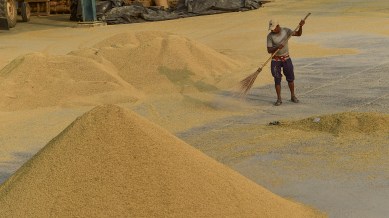Stay updated with the latest - Click here to follow us on Instagram
Season of discontent: As paddy procurement begins today, Punjab arhtiyas, mandi labourers proceed on strike
Millers, too, halt stocking of rice creating potential crisis in paddy supply chain

As the official paddy procurement is set to commence in Punjab from October 1, two major Arhtiya Commission Agent associations have declared a strike, announcing they will not procure a single grain, including Basmati rice, from grain markets until the government addresses their demands. Alongside the Arhtiyas, rice millers too have halted the stocking of rice, creating a potential crisis in the paddy supply chain. Also Punjab Mandi labour unions too announced their strike from October 1, recently.
This year, as in the past, the government will stock paddy at the rice sheller mills following the procurement, which will later be milled and picked up by the Food Corporation of India (FCI) throughout the year. In Punjab, paddy is cultivated across approximately 3.2 million hectares, with Basmati rice grown on over 600,000 hectares. Early varieties of rice are already being harvested, and the state anticipates around 200 lakh metric tonnes of paddy to arrive during the current harvesting season, which extends from the first October to the second week of November.
monthly limit of free stories.
with an Express account.
Vijay Kalra, president of the Federation of Arhtiya Association of Punjab, emphasized the plight of the 50,000 commission agents across the state who facilitate the procurement of wheat, paddy, and other crops. He said that Arhtiyas must receive a 2.5% commission on crops procured by the government. The commission has been fixed at Rs 46 per quintal since 2018-19, which is no longer tenable given rising costs. “Due to this freeze on commissions, our income resources are severely limited. It has become increasingly difficult to cover medical and educational expenses for our families, and frustration is mounting among us and the 10 lakh families associated with our operations,” Kalra noted.
He also raised concerns about the FCI’s practice of deducting approximately Rs 50 crore from commission agents’ payments for Employee Provident Fund (EPF) contributions, which have neither been paid to the EPF department nor to labourers. Kalra explained that EPF is not applicable to commission agents, who typically employ 5-8 seasonal laborers per shop, often consisting of migrant workers from other states. He urged that this amount be released as soon as possible.
In addition, Kalra pointed out that since 2011, FCI has been taking wheat in bulk from the Adani Silo in Dagru (Moga), with commission previously paid in full. However, during the current RMS 2023-24 procurement season, FCI has paid only half (Rs 23 per quintal) of the commission rate, with the remainder still pending. He called for immediate action to rectify this situation.
Further complicating matters, the Malwa region, known for its cotton production, has seen the Cotton Corporation of India (CCI) cease its commission payments on purchases, leaving local Arhtiyas struggling to meet their financial obligations.
Kalra noted the discrepancy in labour payments as well, stating that while the central government agency in Haryana compensates labourers Rs 3.23 per bag for loading, Punjab Arhtiyas only receive Rs 1.80, which, he said, was unjust. He criticized the government’s handling of quality control during last wheat procurement, stating that blame is often misplaced on Arhtiyas for quality issues stemming from delayed transportation of goods.
Ravinder Singh Cheema, another prominent leader in the Arhtiya community and president of Arhtiya Association Punjab, echoed the concerns, emphasizing the need for efficient transportation of procured paddy from mandis to avoid long storage times, which ultimately leads to financial losses for commission agents. He also pointed out ongoing discrepancies in the Punjab portal and Mandi Board marketing portal, which result in hefty deductions from labour charges.
Meanwhile, rice millers in Punjab face their own set of challenges, with slow movement of rice from mills aggravating their financial strain. Prem Goel, president of the Akhil Bhartiya Shellers Sangh, stated that it is becoming increasingly difficult to procure paddy this season, as shellers are unwilling to stock it due to heavy losses incurred from government policies. Tarsem Saini, president of the Punjab Rice Millers’ Association, confirmed that over 5,000 rice mills in the state have refused to stock rice, citing substantial financial losses.
As the paddy procurement season approaches, both Arhtiyas and rice millers are united in their demands for a fair resolution to their grievances, hoping to engage with the government to establish a more sustainable and equitable procurement process.
Rakesh Tuli, president of Punjab Anaj Mandi Mazdoor Union, said that there has been no visible increase in the wages of flavours in the green markets for several years. He also extended support to strike beginning on October 1.